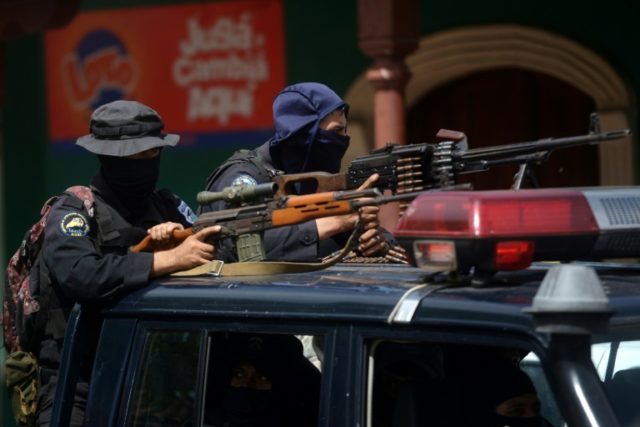State Department spokeswoman Heather Nauert offered an official condemnation for the communist government of Sandinista leader Daniel Ortega in Nicaragua on Tuesday, urging his regime to end its “cowardly attacks” on unarmed protesters and Catholic leaders, including clergy.
Nauert’s remarks come amid an unprecedented ministerial promoting religious freedom at the State Department attended by a priest who personally lived persecution in Nicaragua.
Ortega, a longtime ally of dictators Raúl Castro and Nicolás Maduro in Cuba and Venezuela, respectively, began experiencing widespread protests against his regime in April that have grown violent as Ortega’s government agents and paramilitaries increasingly use violence to suppress opposition. Ortega has turned his both official and unofficial sources not just against protests, many of whom are young college students, but against the Vatican, as the Catholic Church was called in as a mediating presence between both sides. Nicaraguan law enforcement and unofficial pro-Ortega paramilitaries have killed hundreds of protesters; police have arrested thousands, many subjected to torture and inhumane treatment.
“The United States Government condemns the ongoing the violence and intimidation by the Ortega-controlled armed groups in Nicaragua,” Nauert told reporters on Tuesday. “That includes the arbitrary arrests of 700 Nicaraguans who have opposed the Ortega government, as corroborated by multiple sources.”
“We also condemn the cowardly attacks on the Catholic Church leadership, the buildings, and adherents there. Along with the deaths of hundreds of protesters, the attacks have been widely documented internationally and are completely unacceptable,” she continued. “The Nicaraguan Government cannot continue to its excuse its behavior and blame others for its actions or the actions of those affiliated with it.”
“We join the international community in calling for early, free, fair, transparent elections and the protection of universal human rights in Nicaragua,” Nauert concluded, echoing the demand of protesters who wish to have a choice for head of state other than Ortega, in power on and off since 1979.
Nauert also noted that a Nicaraguan priest with first-hand knowledge of Ortega’s repression was visiting the State Department to discuss his ordeal. Father Raúl Zamora told Voice of America that he was present at the siege of the Divine Mercy parish in Nicaragua following the church taking in student protesters who sought refuge from police and paramilitary attacks.
The students were barricaded in the church for about 16 hours, he said, and suffered a “continous attack” throughout, leading to the death of two students – which Ortega has denied occurred. “That was the saddest because we had already agreed that they were going to leave peacefully, but the attack happened,” he noted, emphasizing that Ortega had called for church intervention before “calling us coup plotters … demonizing us, saying we were terrorists.”
Witnesses to the Divine Mercy siege say that police “discharged their entire heavy arsenal against stones and mortars … they wanted to kill us all.”
The priests and clergy members helping to protect young protesters insist that they are peaceful and their subjects unarmed, seeking only elections and a free society.
“We will keep being shepherds and the shepherds of the Catholic Church never stand with the hangmen, we will always be with the victims,” Bishop Silvio José Báez of the Archdiocese of Managua told the New York Times this week. “What we have here is an armed state against an unarmed population, this is not a civil war.”
In addition to attacks on protesters in churches, clergy have denounced vandalism and desecration of sacred spaces apparently for its own safety. The Vatican reported this week that at least one diocese has complained of theft of the tabernacle by “some seeking to defame the church,” while another recent attack involved unknown paramilitaries constraining and physically intimidating four priests in La Trinidad, northern Nicaragua.
Priests fear similar and more brutal attacks in the future, including physical attacks on clergy.
“They have threatened us with death because they say we are in charge of this situation, but we have shown our face because what this government is doing is unjust,” Father Augusto Gutiérrez of the Monimbó parish in Masaya said in a statement this week. “This is a genocide, there is no other name for it … please don’t let us die.”
Ortega recently responded to critics in an interview with Fox News where he insisted that the nation is “becoming more normal” as police arrest protesters and make them disappear.
“It’s been a week now that turmoil has stopped. Matters are becoming more normal in the country and there have been some demonstrations both against and in favor of the government,” he told Bret Baier. “There were armed attacks by paramilitary groups against organizations of the state, against the police, against loyal Sandinista families, and then they [the protesters] started blocking the entire country.”
Ortega rejected the idea of early elections, stating that they will occur as planned in 2021.

COMMENTS
Please let us know if you're having issues with commenting.